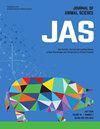二氢杨梅素通过调节氧化应激和抑制NLRP3炎性体减轻脂多糖诱导的断奶仔猪肠道损伤
IF 2.7
2区 农林科学
Q1 AGRICULTURE, DAIRY & ANIMAL SCIENCE
引用次数: 0
摘要
本研究探讨了二氢杨梅素(DHM)对脂多糖(LPS)诱导的断奶仔猪肠道损伤的影响,并研究了其可能的分子机制。结果表明,日粮中添加DHM可改善LPS诱导的仔猪空肠形态结构,减轻空肠黏膜炎症和内质网应激,提高空肠黏膜抗氧化能力和核因子红细胞2相关因子2(Nrf2)的表达,改善空肠黏膜通透性。此外,DHM 还能下调类毒素受体 4(TLR4)、磷酸核因子卡巴-B(NF-κB)、缺氧诱导因子-1α(HIF-1α)的表达,以及 NOD 样受体家族含吡咯啉结构域 3(NLRP3)炎性体的活化。综上所述,LPS可诱导断奶仔猪空肠黏膜损伤,但日粮添加DHM可在一定程度上缓解LPS诱导的空肠黏膜损伤,其机制可能与激活Nrf2抑制氧化应激和负调控TLR4/HIF-1α/NLRP3信号轴的激活有关。本文章由计算机程序翻译,如有差异,请以英文原文为准。
Dihydromyricetin attenuates lipopolysaccharide-induced intestinal injury in weaned piglets by regulating oxidative stress and inhibiting NLRP3 inflammasome
This study explored the effects of dihydromyricetin (DHM) on lipopolysaccharide (LPS)-induced intestinal injury in weaned piglets, and also investigated its possible molecular mechanism. The results showed that dietary supplementation of DHM could improve the jejunum morphological structure of piglets induced by LPS, reduce jejunum mucosa inflammation and endoplasmic reticulum stress, increase jejunum mucosa antioxidant capacity and the expression of nuclear factor erythroid 2-related factor 2 (Nrf2) and improve jejunum mucosa permeability. In addition, DHM downregulated the expression of tolllike receptor 4 (TLR4), phosphor-nuclear factor kappa-B (NF-κB), hypoxia-inducible factor-1α (HIF-1α), and the activation of the NOD-like receptor family pyrin domain containing 3 (NLRP3) inflammasome. Taken together, LPS could induce jejunum mucosa injury in weaned piglets, but dietary supplementation of DHM alleviated LPS-induced jejunum mucosa injury to a certain extent, and the mechanism may be related to the activation of Nrf2 to inhibit the oxidative stress and negatively regulate the activation of the TLR4/HIF-1α/NLRP3 signaling axis.
求助全文
通过发布文献求助,成功后即可免费获取论文全文。
去求助
来源期刊

Journal of animal science
农林科学-奶制品与动物科学
CiteScore
4.80
自引率
12.10%
发文量
1589
审稿时长
3 months
期刊介绍:
The Journal of Animal Science (JAS) is the premier journal for animal science and serves as the leading source of new knowledge and perspective in this area. JAS publishes more than 500 fully reviewed research articles, invited reviews, technical notes, and letters to the editor each year.
Articles published in JAS encompass a broad range of research topics in animal production and fundamental aspects of genetics, nutrition, physiology, and preparation and utilization of animal products. Articles typically report research with beef cattle, companion animals, goats, horses, pigs, and sheep; however, studies involving other farm animals, aquatic and wildlife species, and laboratory animal species that address fundamental questions related to livestock and companion animal biology will be considered for publication.
 求助内容:
求助内容: 应助结果提醒方式:
应助结果提醒方式:


